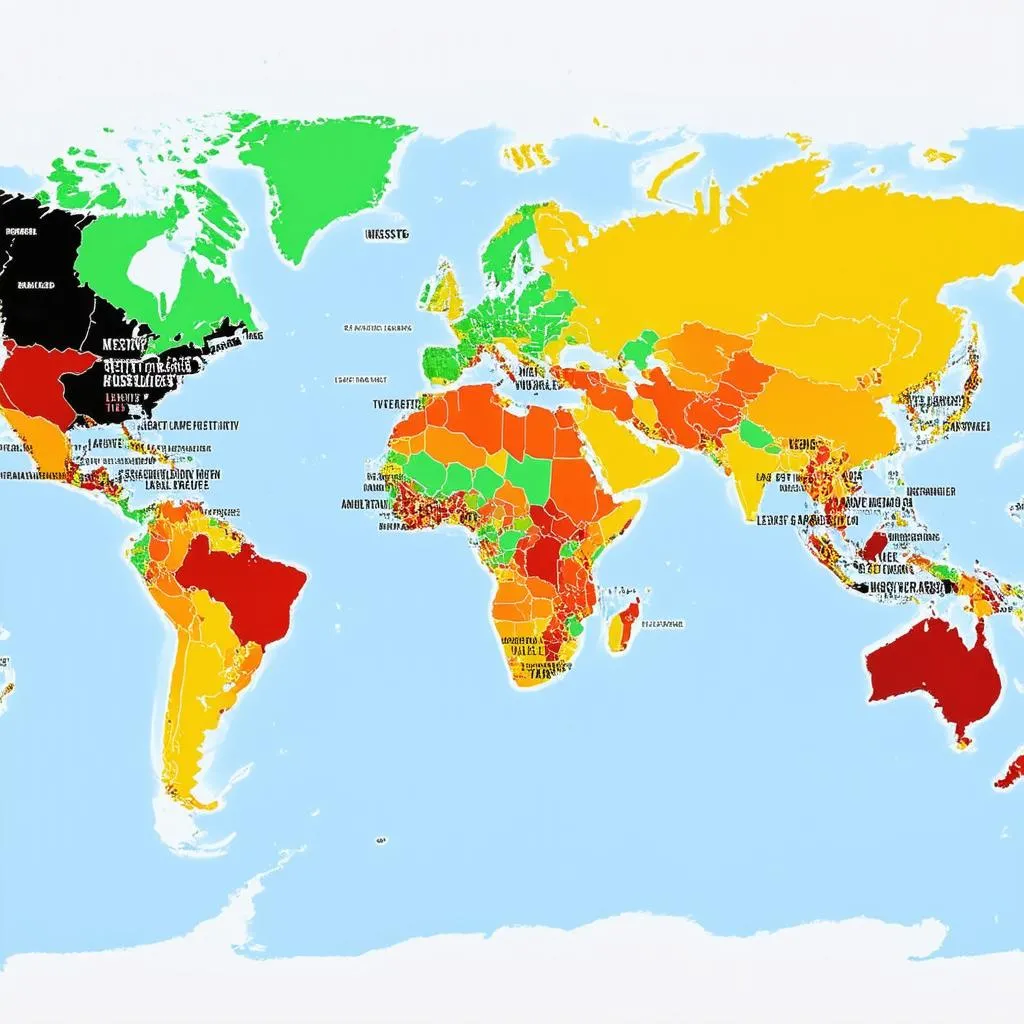“The world is a book and those who don’t travel read only one page.” – Saint Augustine. This quote resonates deeply with travel enthusiasts, always eager to flip through the chapters of this magnificent book. But what happens when a chapter warns you about potential dangers? That’s where the question of worldwide travel warnings comes in.
There isn’t a singular, global “travel ban” in place right now. However, that doesn’t mean the world is a risk-free playground. Various countries and organizations issue travel advisories, which are essentially warnings or recommendations regarding travel to specific destinations. These advisories can range from cautionary to urging complete avoidance, depending on the perceived threat.
Understanding Travel Advisories and Staying Informed
Imagine you’re planning a trip to the vibrant city of Marrakech, Morocco, enticed by its colorful souks and delicious tagines. You’d want to be aware of any potential health risks, political instability, or safety concerns, right? That’s precisely where travel advisories come in.
Why Are Travel Advisories Issued?
Countries and organizations issue travel advisories for a multitude of reasons, including:
- Health Risks: Think outbreaks of infectious diseases, lack of adequate medical facilities, or environmental hazards.
- Political Instability: Political unrest, protests, or armed conflicts can significantly impact traveler safety.
- Natural Disasters: Earthquakes, hurricanes, volcanic eruptions – nature’s fury can disrupt travel plans and pose risks.
- Terrorism: Sadly, terrorism remains a concern in some parts of the world.
- Crime Rates: Areas with high crime rates might warrant cautionary advisories.
Where to Find Reliable Travel Information
Before you pack your bags and book that flight, it’s crucial to consult reliable sources for travel advisories. Here are a few key resources:
- Government Websites: Your country’s government likely has a dedicated website or section for travel advisories. For instance, US citizens can refer to the US Department of State’s website.
- International Organizations: The World Health Organization (WHO) often issues health-related travel advisories.
- Travel Insurance Providers: Many travel insurance companies provide up-to-date information on travel advisories.
Planning Your Trip: Safety First
Now, let’s address some common questions travelers have about worldwide travel warnings:
“Are travel advisories mandatory?”
Travel advisories are, for the most part, recommendations, not legally binding orders. However, ignoring them can be unwise and potentially dangerous.
“Do travel advisories impact travel insurance?”
This is crucial! Many travel insurance policies have clauses stating they might not cover you if you travel to a destination against their recommendations or your government’s advice.
“What if I’m already in a country when a travel advisory is issued?”
Stay calm! Contact your embassy or consulate for guidance. They can provide information on the situation and potentially assist with evacuation if necessary.
Travel Smart: Tips for a Safe and Enjoyable Trip
While travel advisories might seem daunting, don’t let them deter your wanderlust. Here are some tips for safe and enjoyable travels:
- Research Thoroughly: Before booking, delve into your destination’s safety, health risks, and political climate. Check for any travel advisories in place.
- Stay Updated: The world is dynamic! Things can change quickly. Stay informed about your destination’s situation even during your trip.
- Register with Your Embassy: Let your embassy know your whereabouts, especially if traveling to politically unstable regions.
- Get Travel Insurance: Protect yourself financially and medically in case of unexpected events.
Travelcar.edu.vn: Your Guide to Safe and Informed Travel
At TRAVELCAR.edu.vn, we understand the importance of safe and responsible travel. We encourage you to explore our website for more insightful articles on travel advisories, tips for staying safe abroad, and detailed guides on various destinations like the Bahamas, Mexico, and Fiji. Remember, a well-informed traveler is a safe traveler.
 Travel Advisory Map
Travel Advisory Map
Planning Your Itinerary with Feng Shui
Believe it or not, even travel can benefit from a touch of Feng Shui.
- Choose Your Direction Wisely: In Feng Shui, each compass direction represents different energies. For example, traveling east is believed to enhance health and family harmony.
- Pack with Intention: Pack items in colors that align with your travel intentions. Green for growth and new beginnings, blue for calmness and clarity.
- Be Mindful of Your Surroundings: Choose hotels and accommodations with good Feng Shui. Look for natural light, open spaces, and avoid rooms facing sharp corners.
 Feng Shui Travel Essentials
Feng Shui Travel Essentials
Embrace the World, Responsibly
While there might not be a worldwide travel warning stopping you from exploring the globe, remember that responsible travel is key. By staying informed, planning ahead, and respecting local customs, you can turn the pages of the world’s book safely and create unforgettable memories.
Do you have any questions about travel advisories or planning your next adventure? Share your thoughts and experiences in the comments below!

